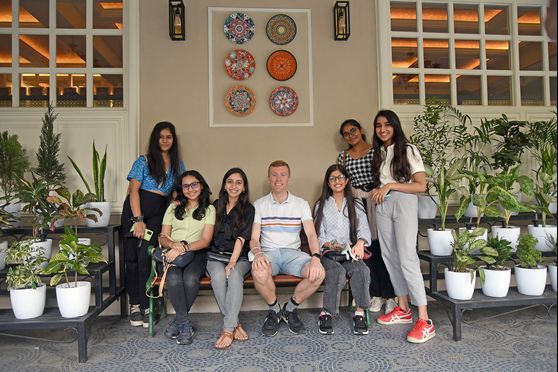Students work together despite culture differences: Daniel Emmerson on Global Ambassadors


Daniel Emmerson, the director of Felsted School, a boarding school in North Essex, UK, was in Kolkata to meet students of Modern High School for Girls who have joined the British school’s Global Ambassadors project.
Edugraph caught up with Emmerson as he went around the city with the Modern High School students. Excerpts from the conversation:
Tell us about Felsted School and the Global Ambassadors project.
Felsted is a 457-year-old independent co-educational boarding school. Although it is a very old school, we are progressive in our thinking in terms of our focus and educational opportunities for young people.
At present, we have about 1,100 students aged between 4 and 18 and 20% of them are overseas students. We belong to different international organisations across about 40 countries. For the past five years, we have been working in collaboration with Think Education in Mumbai to expand some of our global initiatives.
We have a summer programme from July to August for anyone who wishes to join from other countries to experience what it is like to study in a British boarding school. When the pandemic hit UK in March 2020, we had to cancel our summer school programme and decided to run online initiatives instead so that students from around the world could join easily. The focus is on global study with emphasis on migration theory, international relations, political science, human rights protection, environmental protection and more. Students collaborate and work together in different subjects in spite of culture differences. Students actually created this incredible online community and students like the ones at Modern High School wanted to do more than just attend classes. So, we introduced the Global Ambassadors.
Which other countries are involved with Felsted?
We have an extensive network of countries that we work with. Since September this year, I have visited our partners in Serbia, Italy, Germany, France, Lithuania, Argentina, Poland, Ukraine and others. We have built a huge network from America to East Asia. Next year we are planning trips to Japan, Vietnam, Thailand, Brazil, Argentina, Colombia, Mexico and Peru. It is really an extensive network.
How are the Global Ambassadors selected? What are the projects that the Global Ambassadors are working on?
Initially, we would just ask around and anyone who wanted to be a Global Ambassador could become one. Anyone with enthusiasm could work as an ambassador. Over time, some students couldn’t continue. Now the ambassadors have specific roles and focus. They are selected for the roles through an interview system created by the students themselves. Accordingly, who should do what is decided. It is a student-driven programme now.
The idea is to continue the conversation in subjects we discuss in our classes. So, with something like human rights protection, we might take up a specific issue or world affair that needs attention. Our ambassadors look at initiatives such as creating social media content to raise awareness and they also encourage other students to participate in our online programmes. There are online symposiums that are completely free and probably that’s why more than 2,000 students joined us over the last two years.
From a filmmaker to a global educationist, tell us how it happened.
I studied film production for my bachelor’s degree and wanted to set up a production company. That was my main focus after I graduated and I managed to do that. I made a couple of films, too, and those films were all in the education sector. I started working for projects in England, Romania, China, Morocco, the US, Brazil and every one of those projects was about education and how people learn. I became greatly involved in independent education in particular. I ended up teaching film production and attained qualification in teaching English. I was pulled drawn towards the education sector. After working in Millfield School, UK, for five years, I took admission to complete my first master’s degree in International Relations. With Felsted, my global journey began in March 2014. Everything I do is a collaborative team effort.
 Learning can be defined in many different ways. Students who didn't have access to online classes that promote multiple perspectives are at a significant disadvantage. With our programmes, we aim to connect children from all over the world so that they can embrace a range of perspectives and learn from each other- Daniel Emmerson, Director of Felsted School, UK
Learning can be defined in many different ways. Students who didn't have access to online classes that promote multiple perspectives are at a significant disadvantage. With our programmes, we aim to connect children from all over the world so that they can embrace a range of perspectives and learn from each other- Daniel Emmerson, Director of Felsted School, UK
What is your purpose of coming to India?
My journey to India is organised by Ishana Malkani of Think Education. I work with them to develop partnerships in Kolkata, Pune, Mumbai, Bangalore and Delhi. We are also working on projects in Jammu and Kashmir. We are trying to make the most of our partnerships after the pandemic. The partnership with Modern High School is particularly special because of the engagement of the students. Today we are doing a virtual excursion of Kolkata. We are showcasing to the world the girls’ favourite parts of the city. The aim is to show other students of the world what Kolkata is like. We are showing a bit of history, religion and food.
Is this your first time in Kolkata?
No, this is my second time in Kolkata and I don’t know how many times in India. I enjoy being here very much. Last time, I had tried Bengali sweets and snacks. This is the first time I am having Bengali lunch at a Bengali restaurant (6 Ballygunge Place). I liked everything, specially the luchi and mishti doi.
What are you planning on next?
Up next, we have a symposium in December. The students are busy preparing for it. We have had meetings. It is too early to say anything more about it but it is going to address some very important topics concerning humankind. The students here are very hard working. Especially these girls who are taking me around. I am impressed by them.